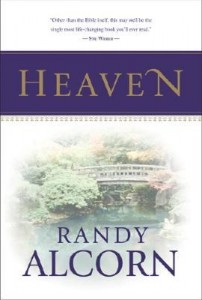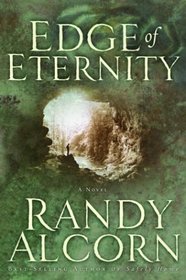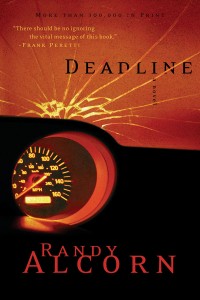Randy Alcorn on Story, Courage, and The New Earth, Part 1
A popular pastor and author, Randy Alcorn has given Christians many works of nonfiction on topics ranging from life issues, birth control, stewardship, and especially living in light of eternity. Yet he has also penned bestselling fiction like Dominion, Deadline, and the award-winning Safely Home. Now in this first of a two-part series, Alcorn shares his thoughts on the power of story, Christians’ responses to speculative genres, writing Courageous for the new film, and the prophesied New Heavens and New Earth.
What led to your love of God-honoring sci-fi and fantasy?
 As I child, I loved to read science fiction and fantasy. I was the kid who, after mom said “lights out,” turned on the flashlight and read comic books and science fiction under the covers.
As I child, I loved to read science fiction and fantasy. I was the kid who, after mom said “lights out,” turned on the flashlight and read comic books and science fiction under the covers.
As an adult, I’m still a big science fiction fan (I went to a Star Trek convention and had a blast, but no, I wasn’t dressed like a Klingon). I believe science fiction is the result of mankind’s God-given sense of adventure, wonder, creativity, and imagination. It emerges from being made in God’s image.
Like everything else undertaken by sinful humans, science fiction is often riddled with false philosophies and assumptions that glorify mankind and ignore God. But this shouldn’t cause us to dismiss its glimpses of what an infinitely creative God might one day fashion across the broad expanse of the new heavens and the New Earth. (See the EPM website for more on the New Earth.) Is God’s imagination less than that of his image-bearers? Or is the height of human imagination at its best a reflection of the infinite creativity of the divine mind?
When we get excited reading Tolkien’s The Lord of the Rings trilogy or Lewis’s The Chronicles of Narnia, it’s not our sinfulness that arouses that excitement. It’s our God-given hunger for adventure, for new realms and new beings, for new beauties and new knowledge. God has given us a longing for new worlds.
As a nonfiction writer and Bible teacher, I begin by seeing what Scripture actually says. As a novelist, I take that revelation and add to it the vital ingredient of imagination. As C. S. Lewis said, “While reason is the natural organ of truth, imagination is the organ of meaning.” In the words of Francis Schaeffer, “The Christian is the really free man—he is free to have imagination. This too is our heritage. The Christian is the one whose imagination should fly beyond the stars.”
Schaeffer always started with God’s revealed truth. But he exhorted us to let that truth fuel our imagination. Imagination should not fly away from the truth but fly upon the truth.
 When I wrote my books Edge of Eternity and The Chasm, both otherworldly tales with an allegorical feel, I wanted to help readers understand that we best grasp the very world we live in when we see it through new eyes. My goal is to take the reader to another world. In that place, you can’t take for granted the things you take for granted here. In fact, in that other world, you are able to see things that are just as real in our own lives, but we lack the power to see them.
When I wrote my books Edge of Eternity and The Chasm, both otherworldly tales with an allegorical feel, I wanted to help readers understand that we best grasp the very world we live in when we see it through new eyes. My goal is to take the reader to another world. In that place, you can’t take for granted the things you take for granted here. In fact, in that other world, you are able to see things that are just as real in our own lives, but we lack the power to see them.
Fiction, including fantasy and science fiction, has that power—to let you see through fresh eyes because you are thinking differently. As a reader, sometimes getting far enough away from your life allows you to look back and see yourself for the first time.
How do great stories point us to the Gospel and the New Earth?
Why do we love great stories? Because they are pictures of the greatest story. There hasn’t ever been a story yet with people living happily ever after, since people die. But one story will come out that way. It’s a true story, and you and I are part of it.
Our Redeemer is our King, who took on death and hell, and defeated them. The first three chapters of God’s story, as told in the Bible, set up the unfolding drama of redemption. The last three chapters show how God will judge evil, reward good, and come down to the New Earth to live with His children forever. He will wipe away every tear from their eyes, and there will be no more suffering and evil.
This is the greatest story ever told. Secular reviewers often say of a book, “This is a powerful redemptive story.” The very concept of a redemptive story flows from the Bible’s story of redemption. It’s the prototype of all great stories.
As a young Christian, I lost myself in the fiction of C. S. Lewis and J.R. R. Tolkien because they reflected a drama with eternal stakes. Though they were fiction, they were filled with far more truth than the world’s nonfiction. Tolkien and Lewis spoke of “true myth”, describing how the real epics of God’s creation and redemption are the substance that casts the shadows of the world’s myths. The myths are signposts pointing to truths far greater and truer than themselves.
People long for stories that give their lives meaning. You couldn’t make up a better story than the truth of God’s unfolding drama of redemption. You can’t find a greater hero than Jesus. The climax will be the return of the King and the establishing of His kingdom.
Why have many Christians tended to avoid visionary stories?
[SF editor’s note: The following section was revised Nov. 21, 2011, at the request of Eternal Perspective Ministries.]
Some Christians view fiction as the opposite of truth. But sometimes it opens eyes to the truth more effectively than nonfiction.
There’s still a stereotype perpetuated by believers who seem to take pride in saying, “I never read Christian fiction because it’s so syrupy and unrealistic; it’s poor quality.” I hear this so often that I have a standard response: “How do you know that if you never read Christian fiction?” Actually, it’s just the popular thing to say, but those who say it are uninformed. Anyone who has actually read much fiction written by Christians in the last ten years knows there are many high quality stories, well-researched and well-written, dealing realistically with all kinds of serious issues. They are no more predictable or preachy than bestselling or award-winning secular novels.
The second bestselling book of all time is Pilgrim’s Progress, a work of fiction written by John Bunyan in the 1670s. It may also be the second most influential book in history.
Jesus taught in parables. He told stories to capture imaginations and move hearts. The reason I started writing fiction in the early 90s was that I love good stories, and I believe they have a Trojan Horse effect.
People open the doors of their minds to a story. The Trojan Horse comes in and the next thing you know the soldiers sneak out and take over the city of the mind. It’s not manipulation, it’s a way of communicating that captures the imagination and moves the heart.

Here’s an example. My novel Deadline has a subplot that involves abortion. Jake Woods was involved with an abortion decision in his past and is plagued by guilt, and ends up in a group of men talking about abortion.
Years ago, our daughters played volleyball and one of the team moms happened to be an outspoken pro-choice advocate. One of the other moms gave her Deadline. I thought, “Oh no! I wish she’d given her one of my other novels instead!”
As much as I knew about the power of fiction, I assumed it was a bad introduction to my writing for this particular woman. Three weeks later, I was sitting at a volleyball game. I hadn’t seen this woman since she’d been given the book. I saw her coming, walking rapidly toward me.
I braced myself, thinking “Here it comes.”
She pointed her finger at me, and said, “Somebody gave me that novel of yours!” Uncomfortable pause. Then she said, “I loved it!”
I was shocked. She asked, “You know what my favorite part of that novel was?”
“I don’t have a clue.”
This non-Christian woman said, “When you showed the conception of a child from Heaven’s viewpoint.”
That was the single most dramatically prolife aspect of the book, and it was her favorite part! I don’t know if she totally reversed her position on abortion, but I know that it profoundly affected her thinking in a way that simply would not have happened just by reading my non-fiction books on the subject. The truth is, she probably would never have read books titled Why Prolife? or ProLife Answers to ProChoice Arguments. And if she had, her defenses would have been up. That’s the power of fiction—to get past the worldview gate-keeper and touch both the heart and the mind.
Next week: more on Alcorn’s novelization for the forthcoming film Courageous, and why studying and anticipating the New Heavens and the New Earth helps Christians grow, in both their imaginations and their love for Christ.
Randy Alcorn is an author and the founder of Eternal Perspective Ministries (EPM), a nonprofit ministry dedicated to teaching principles of God’s Word and assisting the church in ministering to the unreached, unfed, unborn, uneducated, unreconciled, and unsupported people around the world. “My ministry focus is communicating the strategic importance of using our earthly time, money, possessions and opportunities to invest in need-meeting ministries that count for eternity,” Alcorn says. “I do that by trying to analyze, teach and apply the implications of Christian truth.”
Before starting EPM in 1990, Randy served as a pastor for fourteen years. He holds degrees in theology and biblical studies, and has taught on the adjunct faculties of Multnomah University and Western Seminary in Portland, Oregon.
Randy has written more than forty books including the best-sellers Heaven, The Treasure Principle, and the Gold Medallion winner Safely Home.
Alcorn resides in Gresham, Oregon with his wife, Nanci. They have two married daughters and are the proud grandparents of four grandsons. Randy enjoys hanging out with his family, biking, tennis, research, and reading.
You may contact Eternal Perspective Ministries at www.epm.org or 39085 Pioneer Blvd., Suite 206, Sandy, OR 97055 or 503.668.5200. Follow Randy on Facebook, Twitter, and on his blog.





























Thanks for the post. It’s really interesting and worth reading
That was very encouraging to read. The power of stories is undeniable and as Christians we should embrace it wholeheartedly.
This really explains why I write fiction and why especially that I write speculative fiction. I want people to escape, but yet relate to the topics in the story to help them in their own livees deal with their own situations. Great job (as usual) in the guest blog.
Sorry, I just can’t take a guy seriously who believes that rape crisis centers are lesbian recruiting grounds. I’ve read Deadline and written about it as well (my chapter on it may be published in a book next year) and I just don’t see it as a particularly good book, though I grant that Alcorn does have a certain page-turning ability lacking in authors like Spenser Hughes. He’s hardly a re-incarnation of Schaeffer or Lewis though.
John,
If you would like to participate in our discussions, that’s fine. However, your open insults and backhanded compliments toward our guest posters are inappropriate. You’re welcome to disagree and engage in spirited discussion, but this site isn’t target practice. If you’re only here to stir things up and insult people, then you’re not interested in discussion. Thank you in advance.
John, I think the best thing is to engage the content of the post. I know we get sidetracked in our comments, and if what someone says about an article leads to a subtopic, that’s fine. I don’t find it helpful, however, for someone to bring in information that 1) has nothing to do with the post; or 2) is information that no one can verify without extensive research — it’s a conversation killer.
If your past interaction with something Mr. Alcorn has said or written has caused you to lose respect for his views, it’s of course your prerogative to skip this post and next week’s. No one faults you for having an opinion, though we are equally free to disagree. It’s a matter of creating a forum where all people feel free and welcome to engage in discourse around the topic about which our guests write.
If you’d like to discuss Mr. Alcorn’s position about rape crisis centers, I’ll do the research and engage you on the topic via email. Feel free to contact me at rluellam at yahoo dot com.
Becky
I continue to be amazed at how many authors have been inspired by Lewis and/or Tolkien. That alone should show their caliber.
Interesting look at the effects of story — for one, an author can never know where his book will end up or who will read it.
May many more have stories like Randy’s to tell about God putting their book in the hands of an unlikely reader, only to do powerful things through it.
We truly serve an awesome God.
Becky
#1. I LOVE knowing that Mr. Alcorn is a Star Trek fan. I could have stopped reading there, but I’m glad I didn’t.
#2. I’m not pointing the finger at anyone here, obviously, but I think most of us have seen the topic of redemptive-Christian-fiction covered and recovered. For me, it’s almost like a thrice-microwaved cup of coffee. I really considered just skimming this once I saw those words appear. But again, I’m glad I didn’t. I absolutely love that you kicked this off by reminding us, via Schaffer, that for Christians our imaginations are really a measure of our liberty in Christ. Yes, most of us get that we don’t need to be afraid to write certain things, but even more so, that our allegorical, parab(olic?), metaphorical stories don’t need to be fit into some pre-approved redemptive arc. It’s simply a matter of getting someone to open the doors for the “Trojan Horse.”
#3. On a personal note, I think one of the things that I’ve always appreciated about Mr. Alcorn is that it’s always good to see authors rabidly chasing after their own calling and convictions. Mr. Alcorn was introduced to me as the next Lewis. This isn’t to insult the pastor who introduced me to him, but after reading Deadline and the rest, I think it’s probably fair to say the most intelligent of us aren’t looking for the next C.S. Lewis or J.R.R. Tolkien. We don’t need a reborn, or a recycled, or a reincarnated founding father of fiction. Each man is successful when he tries to be a good stewards of his own gifts without trying to add or commentate on those who have come before.
I love fiction. Fiction can reveal great truths and pierce people’s hearts in a more natural, interesting and honest manner than non-fiction ever will. That said, I loved Randy Alcorn’s book ‘Heaven’ and found the weakest bits to be the excerpts from his fiction. Sorry, I don’t know what that says about me.
[…] E. Stephen has posted numerous times on Speculative Faith about what heaven will be like (such as: Heaven Will be the Happiest Place on Earth, The Top Six Myths we Believe About Heaven, When You Long For New Earth, Start Biblical and ‘Normal,’ Then Dream Bigger) His thinking has been influenced by Randy Alcorn’s book Heaven and Alcorn’s thought in general (as set forth for the public by Eternal Perspectives ministries) as evidenced by a post E. Stephen did on Heaven all the way back in 2011. […]